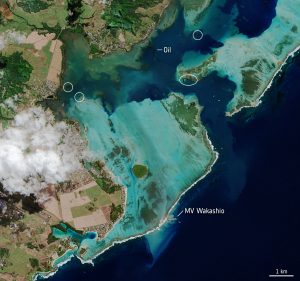The devastating oil spill in Mauritius sends a powerful reminder that for small states such accidents are national security emergencies. They threaten the country’s economy and food security. Mauritius was not prepared for an incident like this, and other small states urgently need to learn the lessons. A similar disaster could have occurred in the Seychelles, the Maldives, Sri Lanka, or elsewhere. Rapid response capacities are required.
On August 7, news broke about an environmental disaster unfolding in Mauritius. The MV Wakashio, which ran aground on the shores of Mauritius on July 25, started to break up and leak oil. While the ship does not have a payload, it is carrying 200 tonnes of diesel and 3,800 tonnes of bunker fuel.
At the time of writing it was reported that 1,000 tonnes had already leaked. With bad weather predicted in Mauritius, it is likely that the hull of the ship will further break up and release all of its deadly fuel. The spill is happening at the Southeastern coast of Mauritius at Pointe d’Esny, directly threatening the marine park of Blue Bay, but potentially the entire main island of Mauritius.
Even if the race to prevent a full spill can be won, the disaster will unfold slowly over the coming days and weeks. It will take the lives of dozens of species living in the marine habitat. Fish, turtles, birds, and other species will lose their habitat for years to come. It is also bad news for the economy of Mauritius.
The disaster, which is already visible from space, happened at one of the main tourist attractions and has the potential to affect other coastal areas and marine zones in the island country. With Mauritius heavily dependent on tourism and fishery, the economic consequences of the disaster will be felt for years, if not decades. In total numbers of tones oil spilled, the event seems minor, compared to other spills. But considering the value of the pristine beaches and coral reefs for Mauritius, it is a disaster of national security proportions.
Like other disasters, oil spills are usually caused by a complex series of events. The most hazardous spill on record, the 1989 Exxon Valdez oil spill in Alaska, was caused by crew fatigue, a broken radar, a change of coastguard alerts and lack of preparedness, among other factors. The ongoing investigation will reveal why the MV Wakashio stranded on the shores of Mauritius. Based on past incidents, crew fatigue or minor technical faults are likely to be at play.
But one of the core factors in the disaster is already known: the lack of preparedness of the Mauritian government to deal with such an accident. The vessel was grounded for two weeks, with the authorities not taking any appropriate actions. Once the leak occurred, Prime Minister Pravind Jugnauth declared that the nation did not have “the skills and expertise to refloat stranded ships.”
The lack of planning and expertise is puzzling, since Mauritius is close to one of the larger shipping lanes destined to South African ports or the Cape of Good Hope route. An accident like this could have happened any time.
Because of a lack of expertise, the Mauritian government became fully dependent on advice from the shipping company and its response consultant. The priority of industry actors is not the protection of the environment, but to minimize the costs implied for clean ups. They also know that environmental destruction is very difficult to quantify in economics terms and dependent on settlement in mitigation or in court.
The press declaration issued by the Japanese owner of the MV Wakashio supports that observation. It indicates that the company downplayed the risk of a larger spill. The fact that France had to send in an assistance team, and that hundreds of volunteers in Mauritius are fighting to contain the crisis, shows how inappropriate the emergency response from the company and its contractors was.
While the insurance company will eventually offer some compensation for the disaster, for Mauritius’ marine habitat this financial contribution will be of little help. Restoration will take decades.
For small states, an oil spill can be a major threat to their economy and to public health. It needs to be treated as a national security issue. Yet the attention of small state navies, coast guards, and other maritime security forces in the Indian Ocean and elsewhere has been in the past decade on blue crimes, such as piracy, smuggling, or illegal fishing. Not enough attention has been given to maritime disaster response and prevention.
For Mauritius it is too late to develop preparedness. For other small states, it is not. In particular small island states, which are fully dependent on the sea, need to urgently review their preparedness and include disaster response in their national security strategies.
Dr. Christian Bueger is a professor of international relations at the University of Copenhagen and one of the directors of the SafeSeas network on maritime security.

































